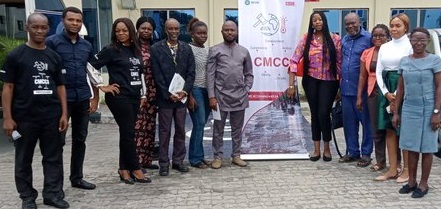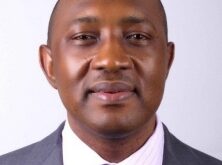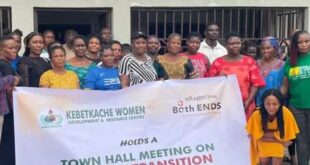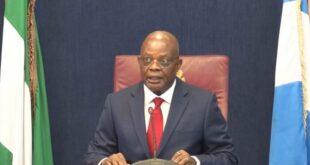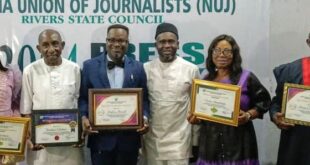.
By Paul Williams
Non-governmental organization, Connected Development (CODE), Tuesday held a capacity building workshop for media practitioners and community-based organizations (CBOs) in Rivers State to enhance their understanding of issues surrounding climate change and justice in the region.
Tagged ‘Community Media Collaboration for Climate Justice (CMCCJ), with support from Oxfam, the workshop, according to CODE’s programme associate, Hyeladzira James Mshelia, sought to build the capacity of community people and the media on issues and incidents emanating from climate change.
“Connected Development is an NGO that empowers marginalized communities in Africa, and as such we have a mandate to build the capacities of citizens and inform them about the dangers of climate change,
“We were in Rivers (State) last year, and we were able to document the impact of the flood. How it affected women and girls, displaced a lot of people, houses were damaged, properties lost and people died from it.
“We are back here again to have a conversation with the community-based organisations and the media, to inform them and build their capacity, to let them know that they have a mandate to demand for accountability and transparency from the government as regards climate financing, and to ensure that the incident that happened last year doesn’t repeat itself,” she said.
Mshelia said that part of the issues before the workshop are the questions: “How is the Nigerian government preparing for a possible flooding this time. What measures have they taken so far. Have they been able to provide incentives for the people that were affected.
“Also, we are building the capacity of community-based organizations and the media on how to follow the money. ‘Follow the Money’ is an initiative of CODE, which seeks to know where funds are coming from and where they are going to, and most importantly, how judiciously the funds are being spent.
“During the training, we are letting them know that they can or should have access to government to demand for these information as citizens,” she said.
Mshelia noted that with regards to mitigating effects of climate change, “everyone has a key role to play as community members. We need to dedicate ourselves, we need to sensitize ourselves. It is really sad that a lot of people don’t even believe there is climate change. Last year (flooding) was an evidence that this is happening and it will probably happen again.
“I will say that as community members, we have a huge role to play in calling on government to provide the necessary things that they are supposed to, and to also educate members of the community on steps they can take to mitigate and address climate change and global warming issues. There are simple actionable steps that we can take, such as disposing of waste properly, sensitizing students on the impact of climate change among others,” she said.
Programme officer at CODE, Nkem Ibeh, said climate change “is not something that can be reversed overnight. What we should be looking at is what are those mitigation policies that are in place to curtail the effect and impact of climate change. What are the coping mechanisms that are in place for people to be able to adapt or find their way around the climate change issues that we see?
“Of course, it is not peculiar to Nigerian. We see climate change incidents all over the world. We hear of wild fire, earthquake and others in other countries. These things are gradually coming down (to Nigeria). And when we begin to experience this kind of incidents that we see in the Western world happening in Nigeria, how will you be able to adapt to them, or cope with the issues.”
A participant at the event, Hon Pius Dukor, commended CODE for organizing the workshop, while adding that “what the Nigerian government is also lacking is the creativity to sensitize the people, communities on what to do and objectives when there is flooding, or it is about to come. Even on how to survive, the survival context, their livelihood when it is destroyed, what should be the next plan.
“You see the whole livelihood of farmers are wiped out, fishermen no longer catch fish, and these are part of the struggle that they have with nature.
“So, I am thinking that this conversation should be carried to the communities, because not when flood comes, NiMET will just give warning. After warning, what next? What preparations are you giving to communities? You just tell them to vacate where they are. Did you also survey where they are going to? Is the place conducive for them, how long will they stay there, do they have the economic mainstay to survive among other issues?”
Another participant, Amb Vincent Gbosi, chairman of Duburo Community Development Committee, Khana Local Government Area of Rivers State, who is also state secretary of Domestic Refinery Owners Association of Nigeria (DROAN), laid most of the blame on government.
Gbosi said that “the government of Nigeria needs to be proactive. For me, they are more reactionary. They wait for problems to happen, for citizens to suffer, and they create conversations around it and that is all. There is no concrete action, no concrete measure, no concrete steps taken by the government overtime.
“In 2012, there were issues around flooding. 2012 and 2023, you know how many years have passed, those same issues still live with the people of Nigeria, with the community people till today. Nothing has been done. If the flooding (last year) was caused by Cameroonian government releasing water from the dam there, what stops the Nigerian government from building a dam to serve the same purpose here,” he said.
#CMC4ClimateJustice
 PH Mundial – Port Harcourt Online Newspaper News Across The Region
PH Mundial – Port Harcourt Online Newspaper News Across The Region

